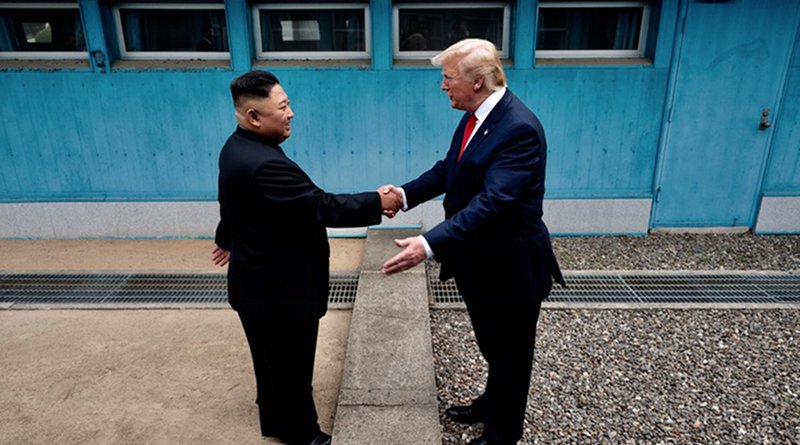North Korea And US Diplomacy: Toward A New Paradigm – OpEd
By Nicolas Jouan
To the despair of international observers and amidst overwhelming international condemnation, North Korea is making its way toward a capable nuclear deterrence. On Thursday October 3, Pyongyang announced the successful testing of a long-range ballistic missile from an underwater platform, raising the prospect of an operational sea-based component to the country’s growing nuclear capabilities (which have so far been limited to the ground leg of the traditional triad).
This new technical feat could potentially bring American coastlines into range of North Korean strategic weapons.
On Saturday 5, two days later, talks in Sweden between the United States and North Korea broke down almost immediately for the second time in a year since a failed meeting between President Donald Trump and Kim-Jong Un in Hanoi back in February. A short “friendly” meeting between Trump and Kim happened in June on the 38th Parallel, but with no outcome. The collapse of the negotiations is reportedly due to a structural disagreement between the two parts on sanction relief, one that no amount of back-patting between the two leaders has been able to resolve.
The general conduct of negotiations between the two parties has left a number of analysts dispirited. The Trump administration seems eager to engage with North Korea, but has lacked a consistent framework to work with so far, besides the long-term goal of “denuclearization.” The actual extent of concessions that each party is ready to put on the table (let alone to accept) is still unclear, and this desynchronization of expectations was already apparent in the failed Hanoi summit.
In order to understand the uncanny diplomatic gymnastics at play between the US superpower and its third-world challenger, one must forget the traditional framework of arms control analysis and, by extension, of diplomacy. It must consider each sides’ positioning in the international system and their subsequent objectives.
President Trump’s diplomatic policy is characterized by a transactional vision of the international order, in rupture with the rule-based framework of the Obama administration. The withdraw from the Trans-Pacific Partnership Agreement in January 2017 and the abandonment of the Joint Comprehensive Plan of Action (JCPOA) in May 2018 epitomizes Trump’s tendency to reject postponed benefits and trust-building for more immediate, bilateral and organic resolutions.
It is tempting to analyze Trump’s policy as an inability to perceive long-term peace prospects hiding behind multilateral agreements and soft diplomacy. But a more profound paradigm shift might be at play here. When the P5+1 agreed on the JCPOA under President Obama, it was within the framework of customary international law and constructive dialogue supported by control-checks and coordinated sanctions among others. It is clear that this framework has been abandoned by the new administration.
The transactional conduct of President Trump’s diplomacy, impersonated by his like-minded Secretary of State Mike Pompeo, does not follow a principled solipsistic pattern of negotiations. It is based on the intersubjectivity of international agents, necessarily reducing diplomatic objectives to moving targets. By intersubjective we mean the definition of reality through the subjective experience of participating agents without preexisting sets of values. Hence the absence of “red lines” such as President Obama’s unfortunate Syrian diplomatic experience.
Back to North Korea, the Trump administration is not primarily committed to denuclearize the Korean peninsula, or to protect Seoul, or to prevent the regime to achieve complete nuclear capabilities, or to counter Chinese influence in the region, or to overthrow Kim’s regime. The aim of the current American diplomatic effort (besides securing the safety of US territory) is to reach as many of these targets as possible for the smallest military, diplomatic and economic tradeoff possible.
The Kim regime seems to have understood this reality very well, which would explain its willingness to develop its nuclear capabilities and to keep pressuring its neighbors. The intersubjectivity of international relations favors short-term wager in order to create a more advantageous status quo independently from the fact that Pyongyang will be considered a rogue state in breach of international law. This is of few concerns for North Korea, since the redefinition of the status quo will crystalize a new set of values upon which the international system will function. Or so the regime believes.
This situation is problematic at two levels. First, it seriously increases the risk of losing control of events. A game of chicken such as this tends to lead to a zero-sum perception of reality, only mitigated by regular meetings of leaders and fragile declarations of friendship. The absence of defined aims can create misunderstandings between the two parties and make them lose too much credibility in the long run. Second, this situation is the result of US fatigue over military shows of force, which started under the previous administration. The questionable US-backed operation in Libya in 2011, followed by the Syrian red-line crisis in 2013, were early signs of an American temptation to return to isolationism after nearly two decades of fighting in the Middle East.
In all likelihood, the upcoming year will reproduce the same pattern of events: negotiations regularly breaking down under a lack of common expectations, punctuated by minor adjustments and relentless North Korean missile testing. The 2020 presidential elections will define the medium-term future of the negotiations, possibly returning US diplomacy to a rule-based order that will struggle to deal with a nuclear-armed rogue state breaching every imaginable rule. But over the long run, a new status quo will necessarily emerge – for better or for worse.
This article was published by Geopolitical Monitor.com

